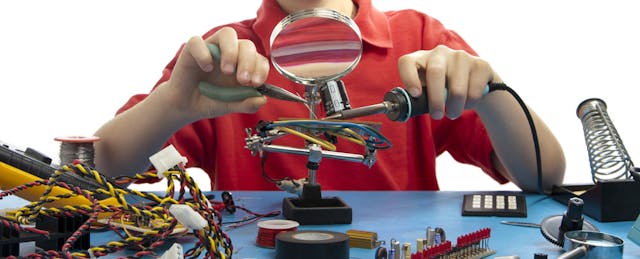Why won’t my daughter engage with school? Is she lazy? Is it too hard? Does she have issues with authority? The answers to these questions lies in her hobbies and the different learning environments she has for each one.
First, she is a dancer. When Annika was two, she told me her dream was to become a ballerina. When she was three, she enrolled at a dance studio and she has been dancing ever since, taking six to eight classes per week. Her learning environment is a studio, with strong authority figures pointing out her strengths, weaknesses, and ways to improve. Issues with authority? Nope.
Second, she is a Maker. Since she was eight she has been exhibiting at Maker Faires and developing increasingly complex wearable projects. From sewing LED lights onto homemade clothes, she has graduated to crafting wearables using arduinos, sensors, and motors. Her learning environment is an apprenticeship; she and I discover together, find experts when we are stumped and iterate, iterate, iterate to get the projects right. Lazy? Nope.
Finally, Annika is a video editor. She uploads twice a week to her Vocaloid Chorus channel. She started by wasting time watching anime. She began drawing manga, then started creating Vocaloid “choruses” mashing up others’ work, and now creates her own Vocaloid “covers” and participates in fan fiction. The adults in her life barely know what any of this is. Her learning environment is made up of online interest groups with individuals that challenge each other and share knowledge and skills. Too hard? Nope.
By the way, she gets good grades. So why is it so hard for her to engage with academic work? Consider the diagram below, which I call the Student Achievement-Ownership Magic Quadrant.

Resigners are students who have low academic achievement and little or no ownership of their learning. Whether they are physically present in a classroom or not, they are disengaged and have in effect dropped out, finding their conditions intolerable.
Hobbyists are students who have complete ownership of their learning, but apply it to non-academic areas. They have tremendous skill and interest in topics they are passionate about such as coding, online gaming, skateboarding, journalism, crafts, fan fiction and other narrow fields that don’t provide broad core academic content.
Compliers are the “good” students who get good grades and follow the rules. They may be low in engagement and self-direction, but they comply with the expectations to excel academically placed on them by teachers and parents.
Scholars are students who apply the passion and self-direction of the hobbyist to academic learning, developing both content knowledge and career skills.
My daughter is a Complier at school, and a Hobbyist the rest of the time. As the former, she will be able to go to college and be successful; she could opt to wait until then to launch her real life. But as a Hobbyist, she is fulfilled, productive and engaged now, gaining the skills and experiences that both improve her quality of life today and will be critical to her future success and happiness.
Why can’t she get that at school? Why can’t everyone?
There are various learning approaches—such as those based in constructivism, constructionism, inquiry, and connectivism—that ignite intrinsic motivation and create an environment where students take ownership of their academic work as they do their passions.
These methodologies can make Compliers and Hobbyists into Scholars. Motivating Resigners requires a greater focus on data-informed instruction, but involves the same pedagogies and instructional approaches.
Note that these approaches don’t change the student; they change the student’s environment to one where she can thrive. Most students aren’t lazy; they are disengaged for a reason. With so much authentic interest-driven opportunity in the outside world, it is incumbent on schools to help kids engage deeply. Until they do, many kids will continue to be disengaged with academics.


